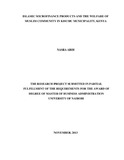| dc.contributor.author | Nasra, Abdi | |
| dc.date.accessioned | 2013-11-26T08:22:46Z | |
| dc.date.available | 2013-11-26T08:22:46Z | |
| dc.date.issued | 2013 | |
| dc.identifier.citation | A research project submitted in partial fulfillment of the requirement for the award of master of business administration degree, school of business, University of Nairobi | en |
| dc.identifier.uri | http://erepository.uonbi.ac.ke:8080/xmlui/handle/123456789/60378 | |
| dc.description.abstract | This study focuses on the influence of Islamic microfinance products on the welfare of Muslim community in Kisumu Municipality. It sought to assess the Islamic microfinance products available and their perceived influence on certain aspects of welfare of Muslim community in Kisumu Municipality. The questionnaires filled and returned were 250 out of an expected 318 representing a response rate of close to seventy nine percent. The specific aspects of welfare addressed in the study include health, education, income and housing. The study adopted a cross-sectional descriptive design. This design was adopted because it focuses at one point in time. The study adopted random sampling technique to obtain a sample size of 318 out of a population 1859.The findings were obtained using a semi structured questionnaire that was personally administered by the researcher. The study established that a majority of the respondents were male. The study established that indeed utilization of the microfinance products had some influence on the welfare of the Muslim community. The study established that Murabaha and Musharaka products were used by the majority of the respondents; followed by Mudaraba and Ijara products, respectively. On the contrary, very few of the respondents used the Qardhul hasan product. It was not very clear why some products were preferred to others. Moreover, the study established that the rate of uptake of the Islamic microfinance products was moderate. The study recommends that banks should take advantage of the lower intake of the products to advertise and campaign with an emphasis on the products and comparison between Shari‟ah compliant microfinance and conventional microfinance. It further recommends proper inclusion of Islamic microfinance on the financial theories of microfinance. The study was limited by the fact that it only focused on Muslims in Kisumu Municipality and therefore its findings may not be applicable to the entire Muslim community in Kenya. The study did not gauge extensively the effect of product differentiation on uptake of Islamic microfinance, a study that may involve gathering information from all stakeholder groups. The study used a cross-sectional design, focusing at only one point in time and therefore its findings may vary over time. | en |
| dc.language.iso | en | en |
| dc.title | Islamic Microfinance Products and the Welfare of Muslim Community in Kisumu Municipality, Kenya | en |
| dc.type | Thesis | en |
| local.publisher | Business Administration, University of Nairobi | en |

